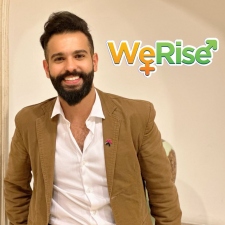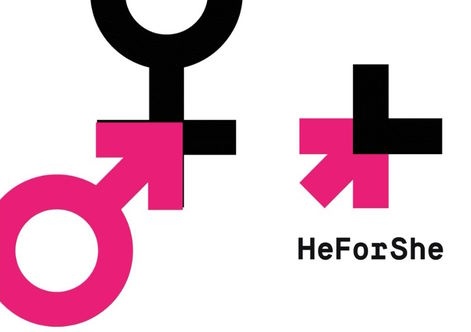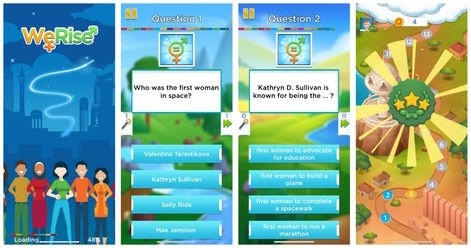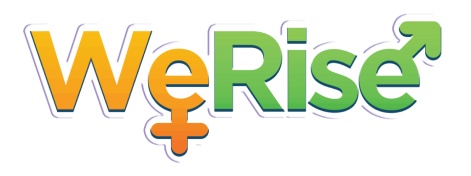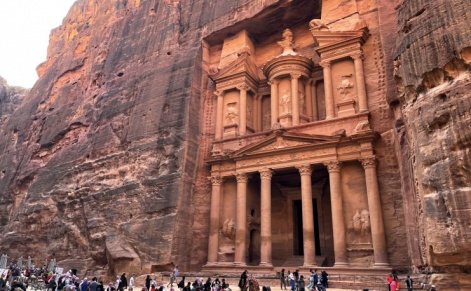Can games help the cause of equality and inclusivity? And can that message catch on in the burgeoning MENA region?
Sometimes, two hot topics come together at once. The capacity for games to do good, and the incredible growth of the Middle East gaming scene, have both been subjects we follow on PocketGamer.biz and at Pocket Gamer Connects events.
Last year, during our activity in the Middle East, we were introduced to Laith Abu Taleb, a game developer based in Jordan who’s using gamification to promote equality. He developed a mobile game called WeRise in partnership with UN Women and studio Maysalward, which aims to educate players about gender equality and to encourage people to think differently about gender roles and the achievements of women. The game was developed with funds from the governments of Sweden and the Netherlands.
In this interview, you will hear about Laith’s background, his inspiration for creating WeRise, and his vision for how games can be used to help empower both women and men around the world. As someone committed to using games for social impact, Laith gives us unique insight into the work of UN Women and the HeForShe campaign, as well as some of Laith’s own experiences making changes in this space.
PocketGamer.biz: Can you tell us a little about your background and personal journey to working at UN Women?
Laith Abu Taleb: I finished my bachelor’s degree in biotechnology genetics and then my master’s degree in journalism and new media. Both in Jordan. And while I was doing my degree, I was passionate about volunteering and doing social work.
A lot of female colleagues from my university came to me, and they used to say, “Oh, how lucky you are because you are a man! You can travel; you can go outside of your city.” It’s the culture that we have in the MENA region in general. I heard this a lot. I used to travel a lot with my university, jumping from city to city and doing a lot of activities. I was feeling good and satisfied towards myself, but I felt like I needed to do something to break down this stereotype.
By chance, I knew about HeForShe. It’s a solidarity movement for gender equality that was launched by UN Women in New York in 2014. I was a big fan of Emma Watson from Harry Potter! And I was following her on Instagram, and I saw the logo of HeForShe. Because I am a biotechnologist working in the genetics field, I recognised the logo of HeForShe. It’s the male and female signs together.
I started looking online, searching about the movement. And I discovered that it’s a solidarity movement for gender equality, with a vision to reach 500,000 men around the world who are able to stand up for women’s rights and empowerment and gender equality.
I signed the HeForShe commitment directly. I took a screenshot and posted this online and said I’m happy that I am one of the first 500,000 men around the world who are willing to stand up for equality with this movement.
From here, the UN Women country office in Jordan contacted me, and I started doing an internship with them in Jordan while finishing my bachelor’s degree. I coordinated and founded the Arabic HeForShe. I started translating all the content that we received from the headquarters and making it fit the culture and the Arab context.
I started learning a lot about gender equality, taking a lot of courses, and helping to mobilise youth activists around me in Jordan. I did a lot of activities inside the universities through different clubs, like debate, art, theatre, and public speaking, with an amazing team who started supporting the movement. Through these, we could deliver the messages of gender equality.
We enhanced our knowledge, and we mobilised more than 40,000 men and women in Jordan who are ready to stand up for gender equality. Jordan became the first country in the MENA region that supports equality through this. We were recognised through the headquarters of UN Women, and we started working more to enhance the Arabic content about gender equality.
Please tell us a little bit more about UN Women. What’s your association with them today? Has it reached its target?
Now I’m working with the regional office in Egypt; we are responsible for the MENA region in general, the Middle Eastern and North Africa region. I’m working with them as an international consultant and a Youth Mobilization Specialist. I was also an international consultant on gamification to take WeRise to the next phase.
We are trying to do different activities and projects to break down stereotypes in the region and to reach a planet where it’s 50/50, and where everyone is equal. We are trying to empower women from the economics field, the political field, and different areas.
And HeForShe worldwide has reached two million people who have made the commitment via the official website. And we reached more than, I think, one billion online conversations on social media and so on. It’s great to see how people interact. And once they see the opportunity, we see a lot of youth there. They are trying to stand in solidarity with us to make a bold change. When I started, I heard a speech by Emma Watson saying. “If not me, who? If not now, when?” So when I started working on HeForShe in my community, I said, “No. It’s me – and now. I should take action.”
It was really hard. I got bullied at my university. So many challenges: a lot of people said that I was trying to do something against the religion, against the community. Which is wrong! I wasn’t doing any of that, but there is a misunderstanding of the difference between sex and gender. We told people what we were trying to do. We are talking about gender equality and breaking down the stereotypes around us to give equal opportunity to everyone.
I founded my own startup that is specialised in edutainment; Because I’m working in gender equality and HeForShe, my idea was to develop an application that is related to gender equality through gamification.
Laith Abu Taleb
If I wanted to be a dancer, I have the right to do it without social pressure. Being a dancer or a nurse, it’s not just a woman’s role; I can do whatever I want. And if my colleague or my sister wants to be an engineer in the electronic field, or fixing cars… They have the right to do that. We should empower everyone. It’s not only just women or girls. It’s for everyone, including boys, because we want everybody to have an equal opportunity – where we can reach a planet that is 50/50. So this is what we told people. We must stand up and celebrate it and take bold action to do this.
Time is passing. And we are moving forward. I graduated from my university. I founded my own startup that is specialised in edutainment; I used to make toys for kids and adults. I participated in some training where they wanted to give us the tools to develop mobile applications. But because I’m working in gender equality and HeForShe, my idea was to develop an application that is related to gender equality through gamification.
I have basic, basic knowledge of designing with Adobe products. I was trying to design the application, not through coding. I’m not an expert in that; I’m able to draw it in Illustrator. I imagined an application called The Opposite Word – back then – I designed the whole gamification system, the scoring system. And at the end of this training, when everyone was presenting their ideas, all my colleagues would stand and say their idea – but I was the only one who was able to stand and show the idea because I could draw it in Illustrator. I could show them on screen how I wanted gamification to enhance the achievement between like the users, I want them to play more, to educate themselves about gender and women’s empowerment, and as they are moving forward, they are taking trophies, coins and a lot of things like that: gamification.
A week later, after this training, the humanitarian organization from the UK that gave us this training contacted me and told me, “We want to develop this application with you – what do you think?” And when I heard this, I approached UN Women and told them, suggesting that since we are already working here on the ground through HeForShe, what about doing this application together? And they agreed.
We had a partner in the first phase, the Netherlands Embassy, the government that sponsored the first phase of the application. And we launched WeRise, based here in Jordan
Please tell us a little bit more about the experience of WeRise. Can you explain a little bit about what the experience is and what people get out of it?
We wanted it to have endless maps and where we could add content. We wanted it to be more interactive and to be not only an informative game but also an application that we could use for different purposes. For example, when you have WeRise, you can find the calendar – when we post a new event, something for the UN, you see a pop-up notification; you receive it on your phone, a notification about UN Women or equality, and you can click on the link for more information. So this is one of the features that we wanted to have so we could create an online community.
We wanted something where people could read blogs and interact and make comments and share it on social media. And users can publish their own topics where they can debate about them. And these are the main features.
But the game itself: it’s an endless map with different levels, and these levels include three games – a quiz with options, a puzzle, and a word search. We use these three mini-games. And the questions are related to women’s empowerment and equality, covering women in politics, in sports, in education and so on. So whenever you reply and answer the questions, you increase your knowledge about women’s empowerment in so many different fields and gender equality. Who is the first woman in space? Who’s the first woman who took five Nobel Prizes, for example? So it’s a thing that we want to put in young people’s subconscious about what women can do if they get an equal opportunity, and maybe the women and girls around us could be like the women in these examples in the game.
But the first phase, when we launched it in Jordan, was only set within the Jordanian culture and community. So the questions were related to Jordan. “Who is the first woman who founded an organization for women’s empowerment in Jordan,” and so on; that’s the way the game was. Two years later, the regional office wanted to make it a global game.
We started working with different teams. We started developing the game more, changing the whole interface of the game and its core elements. So now when you play it, and you open your phone, you can see on the map historic places from Jordan, from Tunisia, from Palestine, from Lebanon, and so on, and related questions. It’s more general. Not only women in the MENA region but women from around the world. We created different teams in different countries. We are targeting the Men And Women programme for gender equality, and in the second phase, the Swedish government sponsored us and supported us in launching it.
How many countries are you targeting now?
The application is open for everyone, in iOS and Android, in three languages: Arabic, English and French. But in this phase, while we were developing, we targeted Jordan, Egypt, Lebanon, Palestine, Tunisia, and Morocco. We have a team in each of these six countries and regular meetings to develop the game.
The game is now more inclusive. You can see a character in a wheelchair because one of the volunteers from Palestine is in a wheelchair. And while we were doing the feedback sessions, she said, “I can’t see a wheelchair in the characters!” And another girl said, “I want to have curly hair.” So while you are building your avatar inside the game, you will have more options. We want to have it be more inclusive because we are focusing on reducing inequalities. Our content comes from the teams: they start giving us information so we can see what’s happening like on the ground; we’re not just doing research from Google. So this is we are able to put the questions in order and decide on the priorities about what content we want to put in the game. We are really using the effort of the people across these six countries.
Is development still going on today? Are you still adding more content to WeRise?
We developed a back-end system for non-developers so colleagues can access basic tools to add questions. They can moderate topics and comments because we wanted it to be a safe space for everyone. We are still adding questions, and hopefully, in the future, in phase three, we can add a fourth language and even more features. It’s now available for everyone in iOS and Android.
And you received support from Maysalward to do this work?
Totally. When we started working on the first phase, we started working with Maysalward. It’s a Jordanian company, and it was easy to contact them and they are super supportive. They already have their own vision, so we matched when we connected with them. It wasn’t difficult to tell them what we wanted, and they helped us in the development process by adding their notes. We have meetings, and they support us. If we told them, “We want to have this feature”, they could give us suggestions.
We have a lot of companies that are developing more games in Arabic. Now we have original content that is developed in Jordan and implemented across the Middle East. Because we have the language, it’s growing.
Laith Abu Taleb
We’ve been talking a lot recently about how in the MENA region, the games industry continues to grow (whereas it’s plateaued a little in places like the UK). What’s your perception of the Games and the app market?
From my personal experience, COVID was a great opportunity to have more access to technology and the internet. And those who never had a smartphone now have one because of support from different organisations. So yes, the industry is growing a lot in the MENA region.
And we have a lot of different companies that are developing more games in Arabic. This is also why it’s growing. Before, we had to download games and see them in English. But increasingly, now we have original content that is developed in Jordan and implemented in the Jordan market and also across the Middle East. Because we have the language, it’s growing.
I feel WeRise could make a huge impact on the future because it’s trying to educate the younger generation about the course we are taking. In 10 years, this young generation will become the parents and have a totally different mindset, developed through the years, with less stereotyping, less judgment, and more information through seeing women and girls and their men and boys like doing whatever they want. I believe it will be something good in the future.
What advice do you have for other games companies and app developers? How should they approach this topic of equality?
To learn about and gain an introduction to the topic of gender. We need to be aware of gender equality. And if we want to stand in solidity and make progress by achieving equality, we need to share knowledge with everybody. For example, sometimes I go to this store in Jordan, and there is a feedback form at the end – but they put “are you male or female” as gender categories, which is wrong. It should be: man, woman, other, prefer not to say, and so on. I see a lot of companies and organizations that don’t have the basic knowledge about this.
We have a lot of partners now. Maybe in the beginning, it was a little difficult to approach the government or organisations or embassies. But now, they are approaching us! So we see things are moving forward.
Laith Abu Taleb
So if we educate more organisations about gender, it will help to make it more inclusive. For example, companies should stop using the colour blue or pink in that traditional way – so they have more gender-neutral colours when creating characters, giving more options so it’s fit for everyone wherever there is a registration phase. We will have accurate information and a better way to register. So this is what we can do with gaming companies to make things more inclusive.
We were just in Saudi Arabia, and it seems there’s much more equality than there now than there was just a few years ago. Currently, there are protests in Iran driven by the equality movement. What’s the general feeling in your community at the moment?
Comparing when we started in October 2015 with now, we can see a huge difference. At the time, in my university, I was walking and feeling uncomfortable – and now, no, people are posting to us on Instagram, “We want to volunteer with you! We want to go out and do activities!”
Because we are working from the bottom up, we are not interacting with the government to change the policies. We are making policy papers, and with our partners, we try to deliver these to the decision-makers to change some laws. But from us, as HeForShe, as a movement, we are working directly with the youth. We have a huge network, and people want to do art exhibitions. They want to make tools for study. They want to help deliver the messages.
Before, it was a concern for some people. Even when we took the group photo at the end, some people said, “I believe in this… but I prefer not to take a picture because I don’t want people to see me here.” But now, no, they feel proud and wear the HeForShe band on their shirt.
We have a lot of partners now. Maybe in the beginning, it was a little difficult to approach the government or organisations or embassies. But now, they are approaching us! So we see things are moving forward. Jordan is actually a small country (you can drive across the country in 10 hours). If you have the vision and support, it’s easy here to network and reach partners who can help you grow and have a wider impact.
You can read more about the game scene in Jordan and the wider MENA region on PocketGamer.biz based on our support for the region in November. Representatives of the Jordan gaming scene, including the King Abdullah II Fund For Development and the Jordan Gaming Lab, will be present at Pocket Gamer Connects London next week. WeRise is available on the App Store now.

